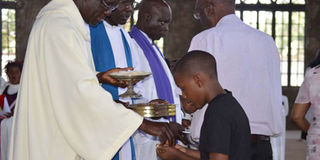A big age-old celebration that is also the sign of a new beginning

St Stephens Cathedral faithful receive Holy Communion during an Easter thanksgiving service in Kisumu on April 16, 2017. While Christmas signifies a beginning, Easter symbolises a renewed beginning or renaissance. PHOTO | ONDARI OGEGA | NATION MEDIA GROUP
What you need to know:
- It is the original Christian festival celebrating the suffering, death and resurrection of Jesus Christ.
- Bede thus drew from the practice of pagan culture to proclaim the Christian belief in the resurrection of Jesus.
Easter and Christmas are the best-known Christian liturgical seasons.
Although Christmas has become the more festive and commercialised, Easter is the oldest and most important Christian celebration.
It is the original Christian festival celebrating the suffering, death and resurrection of Jesus Christ.
Bible scholars are agreed that the earliest accounts of Jesus’ life to be written are those that appear last in the gospels.
CHRIST'S RESURRECTION
These narratives, covering the final week of Jesus’s life constitute a huge chunk of the gospel story.
The accounts in Matthew and Luke about birth and infancy were the very last to be crafted.
Mark, the first of the gospels written between AD65 and AD70, according to the best New Testament scholarship, has not a single word about the birth of Jesus.
Christmas overtook Easter in terms of extravaganza and commercial value.
Saint Paul says the original message he received directly from the Lord was on the institution of the Eucharist (1 Cor 11: 23-26).
And he continues to proclaim that the center of the Christian faith is belief in the resurrection of Christ.
PROPHESIES
The term Easter, as a celebration of the resurrection, can be traced back to Venerable Bede (673-735), the well-known English monk and scholar.
In his Ecclesiastical History of the English People, Bede derives the word Easter from Eastre or Eostre, a goddess whose festival was held at the spring equinox around March 21.
Bede thus drew from the practice of pagan culture to proclaim the Christian belief in the resurrection of Jesus.
For the first generation of Christians, the most vital tenet of the faith was the risen Christ as a fulfilment of Old Testament prophecies.
The resurrection was understood as the culmination of a new Pascha or Passover.
Just as Israel of old had been delivered from slavery in Egypt to the Promised Land, the new people of God were being saved from slavery and led to a new life through the passion, death and resurrection of Christ.
DATE OF CELEBRATION
The early church allocated an intense three-day celebration of the suffering, crucifixion and resurrection to a liturgy that came to be known as the Easter Triduum or three days.
This begins on Thursday evening with the marking of the Lord’s Supper and culminates in the resurrection on Sunday.
During the early Christian era, there were several controversies regarding the date on which Easter should be celebrated.
While some followed the Gregorian calendar in the West, others opted for the Julian one of the East.
Matters were further complicated by a school of thought and practice that insisted on a chronology based on the Jewish calendar celebrated Pascha on 14 Nisan.
According to Prof Richard P. McBrien of the University of Notre Dame, since the Council of Nicea (325), Easter has been celebrated on the Sunday following the full moon after the vernal or spring equinox (between March 22 and April 25).
NEW BEGINNING
It is a combination of several strands. It has borrowed from the Jewish feast of Passover and also re-interpreted the pagan European festival of the goddess Eastre.
Easter is the original proclamation or kerygma of the first Christian believers, whose basic tenet was: He’s risen.
Easter is not as commercialised as Christmas, but family and friends still exchange gifts, including painted or decorated Easter eggs, as a sign of a new beginning.
While Christmas signifies a beginning, Easter symbolises a renewed beginning or renaissance.
Human beings need a sense of re-birth, especially after frustrations, a fall, failure or defeat.
ELECTIONS
Our country needs a sense of cohesion and hope as we prepare for the August 8 General Election.
Faced with huge challenges, and especially the ultimate one, death, the Apostle Paul proclaims his faith in resurrection.
He addresses death, saying: “O death, where is your victory? O death, where is your sting? (1 Cor 15:55). Have a happy Easter, everyone!
Fr Njoroge, the chaplain at Jomo Kenyatta University of Agriculture and Technology, is a professor of Development Studies and Ethics.





